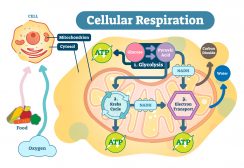Definition
noun, plural: aerobic processes
A process that occurs and requires the presence of oxygen or air
Supplement
An aerobic process refers to a process that requires the presence of oxygen or air as opposed to an anaerobic process that does not require it. An example of an aerobic process is aerobic respiration. The biological cell conducts respiration in a process called cellular respiration. It is a series of metabolic processes that take place within a cell whereby biochemical energy is harvested from organic substance (e.g. glucose) and stored as energy carriers (ATP) for use in energy-requiring activities of the cell. The cell seems to “respire” in a way that it takes in molecular oxygen (as an electron acceptor) and releases carbon dioxide (as an end product). Since the process occurs in the presence of oxygen it is said to aerobic. Conversely, cellular respiration takes place in other organisms that make use of other molecules as electron acceptor rather than oxygen. In this case, the final electron acceptor is not oxygen and therefore the process is described as anaerobic. The aerobic type is more efficient than the anaerobic process when it comes to the number of ATP net gain.
See also:
Dictionary > Aerobic process





